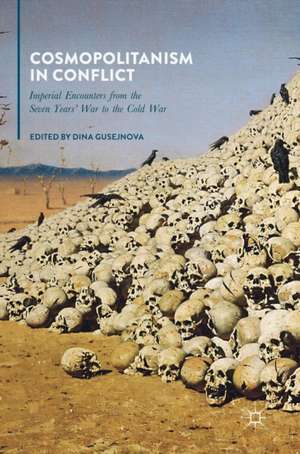Cosmopolitanism in Conflict: Imperial Encounters from the Seven Years' War to the Cold War
Editat de Dina Gusejnovaen Limba Engleză Hardback – 27 oct 2017
| Toate formatele și edițiile | Preț | Express |
|---|---|---|
| Paperback (1) | 334.92 lei 38-44 zile | |
| Palgrave Macmillan UK – 23 mai 2018 | 334.92 lei 38-44 zile | |
| Hardback (1) | 399.88 lei 6-8 săpt. | |
| Palgrave Macmillan UK – 27 oct 2017 | 399.88 lei 6-8 săpt. |
Preț: 399.88 lei
Nou
Puncte Express: 600
Preț estimativ în valută:
76.53€ • 79.60$ • 63.18£
76.53€ • 79.60$ • 63.18£
Carte tipărită la comandă
Livrare economică 15-29 aprilie
Preluare comenzi: 021 569.72.76
Specificații
ISBN-13: 9781349952748
ISBN-10: 1349952745
Pagini: 317
Ilustrații: XVIII, 317 p. 10 illus., 2 illus. in color.
Dimensiuni: 148 x 210 mm
Greutate: 0.69 kg
Ediția:1st ed. 2018
Editura: Palgrave Macmillan UK
Colecția Palgrave Macmillan
Locul publicării:London, United Kingdom
ISBN-10: 1349952745
Pagini: 317
Ilustrații: XVIII, 317 p. 10 illus., 2 illus. in color.
Dimensiuni: 148 x 210 mm
Greutate: 0.69 kg
Ediția:1st ed. 2018
Editura: Palgrave Macmillan UK
Colecția Palgrave Macmillan
Locul publicării:London, United Kingdom
Cuprins
Chapter 1. Introduction; Dina Gusejnova.- Chapter 2. Rules of Engagement in Eighteenth-Century European Wars; Stephen Conway.- Chapter 3. Kant’s Subaltern Period: the Birth of Cosmopolitanism from the Spirit of Occupation; Alexander Etkind.- Chapter 4. The Napoleonic Wars: Reading Perpetual Peace in the Russian Empire; Maria Mayofis.- Chapter 5. Modern Muslim Cosmopolitanism Between the Logics of Race and Empire; Cemil Aydin.- Chapter 6. Cosmopolitanism and Internationalism in modern British political thought: continuities and discontinuities; Georgios Varouxakis.- Chapter 7. A citadel without citizens: Brest-Litovsk as a site of political disorientation; Dina Gusejnova.- Chapter 8. The languages of Caucasian cosmopolitanism: twentieth-century Baku at the crossroads; Zaur Gasimov.- Chapter 9.- Kantian Cosmopolitanism, Stalinist kosmopolitizm, and the making of Kaliningrad; Olga Sezneva.- Chapter 10.The impartial voice: the BBC’s corporate cosmopolitanism between empire and Cold War;Marie Gillespie and Eva Nieto McAvoy.
Notă biografică
Dina Gusejnova is Lecturer in Modern History at the University of Sheffield, UK. She has previously taught at the Universities of Cambridge, UK, Chicago, USA, University College London, UK and Queen Mary University, UK. Gusejnova is the author of European Elites and Ideas of Empire, 1917-57 (2016).
Textul de pe ultima copertă
This book is the first study to engage with the relationship between cosmopolitan political thought and the history of global conflicts. Accompanied by visual material ranging from critical battle painting to the photographic representation of ruins, it showcases established as well as emerging interdisciplinary scholarship in global political thought and cultural history. Touching on the progressive globalization of conflicts between the eighteenth and the twentieth century, including the War of the Spanish Succession, the Seven Years’ War, the Napoleonic wars, the two World Wars, as well as seemingly ‘internal’ civil wars in eastern Europe’s imperial frontiers, it shows how these conflicts produced new zones of cultural contact. The authors build on a rich foundation of unpublished sources drawn from public institutions as well as private archives, allowing them to shed new light on the British, Russian, German, Ottoman, American, and transnational history of international thought and political engagement.
Caracteristici
Explores the history of cosmopolitan thought and feeling through the lens of war Develops new vistas on the genealogy of cosmopolitan thought and internationalist practice Examines Western European cosmopolitan tradition in a global context Includes supplementary material: sn.pub/extras
